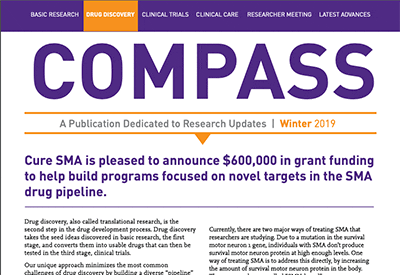Audrey Lewis founded Families of SMA, now Cure SMA, 34 years ago. Audrey recognized early on the importance of attracting new and talented researchers to SMA, with the hope that they would commit their careers to developing a treatment and cure for SMA.
Cure SMA honors Audrey’s legacy with the Audrey Lewis Young Investigator Award, periodically given to younger researchers working in the SMA field. The goal is to make a positive impact on the early phase of a talented researcher’s career, enabling them to focus on the SMA field.
Cure SMA is pleased to announce the second 2019 recipient of the Audrey Lewis Young Investigator Award , Krysta Engel, PhD, at the University of Colorado. Dr. Engel is a post-doctoral researcher, working in the laboratory of Dr. Matthew Taliaferro. She will receive $150,000 for her project, “Transcriptome-wide interrogation of $MN-mediated RNA localization mechanisms in neurons.”
Dr. Engel hypothesizes that tens to hundreds of RNAs, the genetic material that encodes for proteins, are mislocalized in neurons with low levels of SMN and that SMN promotes their proper localization through direct or indirect RNA interactions. Furthermore, given SMN’s known role in splicing regulation, Dr. Engel believes that the misregulated splicing of some RNAs may result in their mislocalization.
This study proposed will use a combination of mouse neuronal cell culture models in which SMN has been depleted, human SMA motor neurons, and functional genomics to gain a deep, mechanistic understanding of how SMN regulates RNA localization and how this important biological process is disrupted in SMA. These findings will provide the foundation for future endeavors to more completely understand how the disease manifests in motor neurons and develop treatments for SMA.
Meet Dr. Engel
Who are you?
My research career has spanned the central dogma of biology; from expression of genes in the form of RNA, use of that RNA template to produce protein, and how those proteins can in turn influence every aspect of that cycle. I have been astounded at the realization that disruptions in the central dogma, even those that seem insignificant, can cause devastating diseases. With this awareness, I have dedicated my career to furthering our understanding of the mechanisms that regulate gene expression, thereby gaining valuable insight into how disruptions in these processes lead to disease states.
How did you first become involved with SMA research?
I have always been fascinated by how molecules, including RNA, are trafficked inside of cells. And why cell types, such as motor neurons, are especially sensitive to disruptions in this process. Understanding how SMA manifests is a worthy goal, and I anticipate that obtaining an understanding of how SMN controls basic cellular processes like RNA trafficking stands in our way of achieving that goal. I therefore sought out a postdoctoral position to combine all these interests.
What is your current role in SMA research?
A comprehensive understanding of SMA, SMN, and motor neuron biology requires a diverse set of expertise. My training in RNA biology, using both molecular biology techniques and analysis of sequencing data, represents an extremely valuable combination with which to characterize how disruptions in RNA trafficking in motor neurons contributes to SMA.
What do you hope to learn from this research project?
The goal of this study is to gain a detailed understanding of an understudied role of SMN in promoting the transport of RNA molecules to the projections of neuronal cells and how this is misregulated in SMA.
How will this project work?
We will quantify the extent to which individual RNAs are transported to projections in cells that either contain or lack SMN. Those that are differentially transported depending on whether or not SMN is present will be prime candidates for further study and represent potential molecular explanations behind SMA phenotypes as well as potential therapeutic targets.
What is the significance of your study?
Insights gained from completion of this study will be the first comprehensive characterization of how RNA localization is disrupted in cells deficient in SMN. Given that SMN is known to be involved in RNA transport and defects in RNA transport are associated with other neurological diseases, this study will give a foothold into understanding the contribution of RNA mislocalization to SMA.
Basic Research Funding
This grant to Dr. Engel is part of $1,150,000 in new basic research funding that we’re currently announcing.
Basic research is the first step in our comprehensive research model. We fund basic research to investigate the biology and cause of SMA, in order to identify the most effective strategies for drug discovery. We also use this funding to develop tools that facilitate SMA research.
Past Announcements
$150,000 to Sibylle Jablonka, PhD
$200,000 to Alberto Kornblihtt, PhD
$200,000 to Charlotte Sumner, PhD



